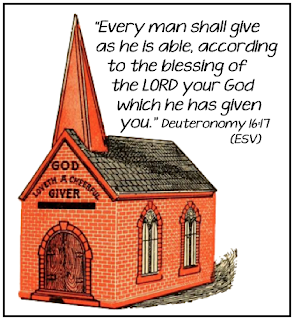 |
| "Every man shall give as he is able, according to the blessing of the LORD you God which he has given you." Deuteronomy 16:17 (ESV) |
Description of Illustration: church shaped mite boxes from the previous century, orange or red bricks printed on the sides, steeple, slot for coins over the door, tiny church windows
The term mite box (also alms box or poor box)
refers to a box that is used to save coins for charitable purposes.
Contemporary mite boxes are usually made of cardboard and given out to
church congregations during the Lente
season. The mite boxes are collected by the church and donations are
given to the poor. Mite boxes are popular with children because they can
fill them with small change and it teaches them the principle of giving
to the poor. The Mite box giving promotes the spirit of contributing
based on the intent to help others and not on the monetary amount.
The origin of the mite box is very old. In 2 Kings 12:9, the priest Jehoiada bored a hole in the lid of a chest and placed it near the first altar, however this was to fund maintenance rather than alms.
Pope Innocent III at the end of twelfth century allowed some mite boxes to be placed in temples so that the faithful people may at any time dispose their alms.
The term mite, according to the dictionary, is defined as any of the following:
The etymology of the word mite comes through Middle English and Middle Dutch from the Middle Low German mīte, a small Flemish coin or tiny animal. In biblical times a mite or lepton was a small coin of almost no worth.
Pope Innocent III at the end of twelfth century allowed some mite boxes to be placed in temples so that the faithful people may at any time dispose their alms.
The term mite, according to the dictionary, is defined as any of the following:
- a very small contribution or amount of money, such as a widow's mite.
- a very small object, creature, or particle.
- a coin of very small value, especially an obsolete British coin worth half a farthing.
The etymology of the word mite comes through Middle English and Middle Dutch from the Middle Low German mīte, a small Flemish coin or tiny animal. In biblical times a mite or lepton was a small coin of almost no worth.
 |
| "He covets greedily all the day long: but the righteous gives and spares not." Proverbs 21:26 (King James 2000) |
 |
| "He that gives to the poor shall not lack: but he that hides his eyes shall have many a curse." Proverbs 28:27 (King James 2000) |
Have a question about the illustration?
Just type it in the comment box and I'll get back to you as soon as
possible. I only publish content that is closely related to the subject
folks.
No comments:
Post a Comment
All comments are moderated and do not immediately appear after publishing. Have a question about the illustration? Just type it in the comment box and I'll get back to you as soon as possible. Have a nice day!
Note: Only a member of this blog may post a comment.